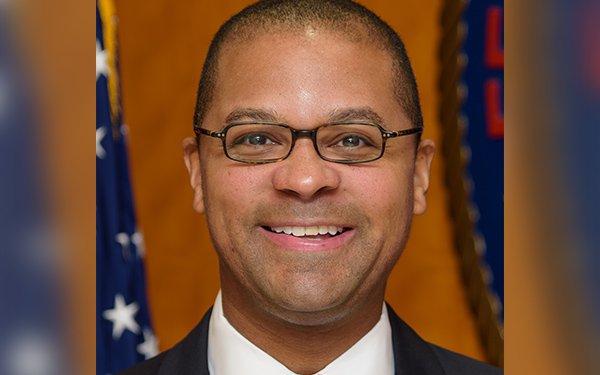
Federal Communications Commissioner Geoffrey Starks, a
Democrat, will exit the agency this spring, more than two years before his term officially expires.
Starks, who was nominated to the agency in 2018 by President Donald Trump, did not say why
he was leaving. He was recently confirmed to a second term, which was set to last through July 2027.
His departure will leave the FCC with just three members -- Republicans Brendan Carr and
Nathan Simington, and Democrat Anna Gomez.
By law, the agency is required to have three members of the president's party and two of the opposing party -- meaning that Starks' replacement must
be a Democrat.
President Donald Trump recently nominated Senate
staffer Olivia Trusty to serve as the 3rd Republican at the agency, but the Senate hasn't yet confirmed her.
advertisement
advertisement
During his tenure at the FCC, Starks opposed Trump's 2020 attempt to force the agency to regulate online speech. In
May of that year, Trump issued an executive order that directed the Commerce Department to petition the FCC for regulations that could discourage social media platforms from removing users' posts
without a "reasoned explanation.”
Specifically, Trump wanted to tie companies' ability to rely on Section 230 of the Communications Decency Act -- which protects social platforms from
lawsuits over posts by users -- to the platforms' content policies.
Trump issued that order after Twitter, now X, alerted users to dubious claims in two of his tweets. Like some other
Republicans, Trump claimed that tech companies squelch conservative opinions more than liberal viewpoints.
Starks said he was “skeptical” that the FCC could issue the regulations
Trump sought.
His resignation comes as Carr, the current FCC Chair, has repeatedly suggested he would like to see the government wield more control over social
platforms' editorial policies.
“We must dismantle the censorship cartel and restore free speech rights for everyday Americans,” he tweeted last November, soon after he
was tapped to helm the agency.
He also recently said in a letter to the CEOs of Google, Meta, Apple and Microsoft that their companies “played significant roles” in what he
described as an “unprecedented surge in censorship.”
Carr went on to accuse the companies of participating in a “censorship cartel” that included advertising and
fact-checking organizations.
Earlier this month, Carr asked Google to address allegations that the virtual multichannel video programming distributor YouTube TV “marginalizes”
faith-based programming -- despite the fact that the FCC doesn't regulate such companies.